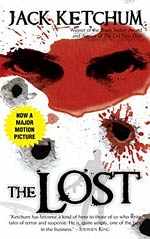
![]() verkisto
verkisto
7/26/2016
![]()
Ketchum's best works are those with innocuous beginnings, which grow in tension and slowly spiral out of control over the course of the novel. The Lost is the opposite, where he begins the story with a big shock, and then takes us forward to the time where the police are still trying to nail the guy they know committed the act, but can't find the proof to put him away.From that point, the story follows a structure that will be familiar to Ketchum's loyal readers -- we watch the central psychopath go on a slow downward spiral of violence and insanity. The opening scene is important to the story, but it was a different approach to the story than his previous books had.
The other difference was in how Ketchum chose to develop his characters. In his other works, he creates a character who we watch develop into someone who horrifies us, but this time he creates a character who's already a psychopath, playing a game of cat-and-mouse with the local police. That's not to say that the story is a procedural mystery, but the novel takes a while to hit that familiar Ketchum pace. It takes getting halfway through the story before it picks up.
I also think Ketchum does his best work when he focuses on just one character, instead of bringing in a larger cast. The Lost has several different characters floating about, with the antagonist and his two hangers-on, the two other women the antagonist becomes interested in, the cop working their case, and the ex-cop who still has an interest in the case. They all feel developed (though Katharine felt out of place; her character seemed to be an attempt to contrast Ray's personality without the violence), but it was a lot of attention paid to his characters. This clocks in as Ketchum's longest novel, and I think that affected the novel's pacing. Where he does shine in this novel is in creating the dynamic between Ray and his two cronies, Tim and Jennifer. It's not a complex relationship, really, but it creates another point of tension that underlies the central story. It carries a feeling of importance, like maybe there's something in that triangle that will eventually bring down Ray.
Where Ketchum has, in the past, created antagonists who can be understood if not forgiven, here he just creates a character with no redeeming factors whatsoever. No real reason is given for why he's the psychopath he is. This isn't necessarily a bad thing in fiction -- some antagonists don't need any development beyond making him a bad guy -- but when Ketchum has proven that he can do more than that, it's a disappointment when he doesn't.
The Lost feels like a Ketchum novel, but at the same time, it doesn't. The style and content will be familiar to Ketchum's readers, but the novel lacks some of the heart found in his previous works. The tone of the novel is colder than his others, which could be due to the finality of the ending. Stranglehold also had a less-than-happy ending, but it felt like it had more warmth somehow. Readers of horror and dark thrillers will likely enjoy it, but I'd point them toward his earlier novels before this one.